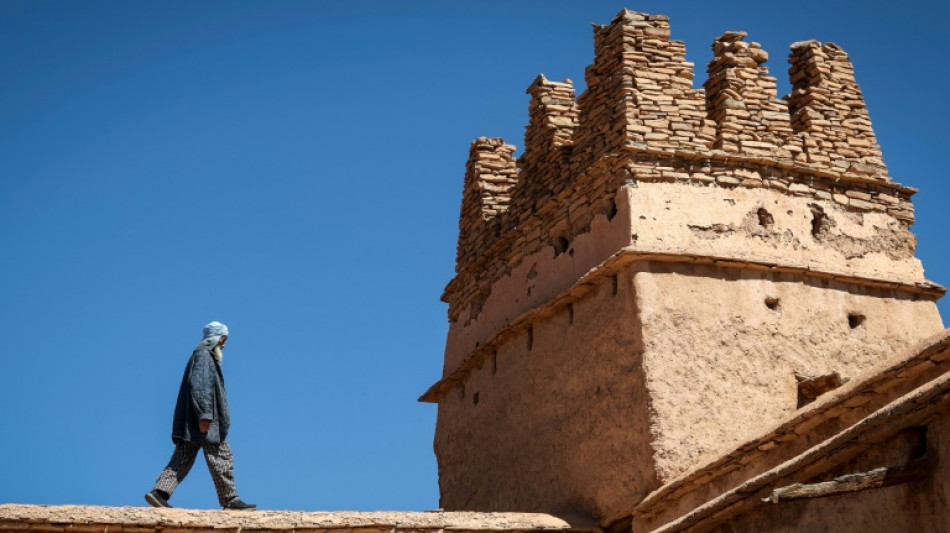
-
 Five things to know about Uganda
Five things to know about Uganda
-
Uganda votes under internet blackout and police crackdown

-
 Dreams on hold for Rohingya children in Bangladesh camps
Dreams on hold for Rohingya children in Bangladesh camps
-
Canada's Carney in Beijing for trade talks with Chinese leaders

-
 All Blacks fire coach Robertson less than two years before World Cup
All Blacks fire coach Robertson less than two years before World Cup
-
Long-awaited EU-Mercosur trade pact set for signing

-
 Trump embraces AI deepfakes in political messaging
Trump embraces AI deepfakes in political messaging
-
A year of Trump: US health policy reshaped in RFK Jr's image

-
 One year in, Trump shattering global order
One year in, Trump shattering global order
-
Hit TV show 'Heated Rivalry' a welcome surprise for gay hockey community

-
 Spanish singer Julio Iglesias prepares defence against abuse allegations: Hola! magazine
Spanish singer Julio Iglesias prepares defence against abuse allegations: Hola! magazine
-
Actor McConaughey seeks to patent image to protect from AI

-
 Musk's Grok barred from undressing images after global backlash
Musk's Grok barred from undressing images after global backlash
-
Hosts Morocco set up Senegal AFCON final showdown

-
 Trump says Iran killings stopped, Tehran says 'no plan for hanging'
Trump says Iran killings stopped, Tehran says 'no plan for hanging'
-
Chelsea paid for costly errors in Arsenal defeat, says Rosenior

-
 Morocco beat Nigeria on penalties to reach Africa Cup of Nations final
Morocco beat Nigeria on penalties to reach Africa Cup of Nations final
-
Golden Globes viewership shrinks again

-
 Astronauts leave ISS in first-ever medical evacuation
Astronauts leave ISS in first-ever medical evacuation
-
NASA reports record heat but omits reference to climate change

-
 Trump praises 'terrific' new Venezuela leader after call
Trump praises 'terrific' new Venezuela leader after call
-
Real Madrid crash out of Copa del Rey at Albacete on Arbeloa debut

-
 Trump says Iran killings stopped as US scales back Qatar base
Trump says Iran killings stopped as US scales back Qatar base
-
Arsenal beat Rosenior's Chelsea in League Cup semi first leg

-
 US stocks fall again as Iran worries lift oil prices
US stocks fall again as Iran worries lift oil prices
-
Inter extend Serie A lead to six points after Napoli slip

-
 Bayern beat Cologne to move 11 points clear in Bundesliga
Bayern beat Cologne to move 11 points clear in Bundesliga
-
Mane takes Senegal past Egypt into final of his last AFCON

-
 Trump says Greenland will 'work out' after Denmark fails to bridge gap
Trump says Greenland will 'work out' after Denmark fails to bridge gap
-
'Bridgerton' premieres in Paris promising 'Cinderella with a twist'

-
 California begins probe of Musk's Grok over sexualized AI images
California begins probe of Musk's Grok over sexualized AI images
-
Astronauts set to leave ISS in first-ever medical evacuation

-
 Napoli's stalemate with Parma opens door for Serie A leaders Inter
Napoli's stalemate with Parma opens door for Serie A leaders Inter
-
Syrian leader urges Kurdish integration as army sends troops east of Aleppo

-
 Denmark says White House talks failed to alter US designs on Greenland
Denmark says White House talks failed to alter US designs on Greenland
-
Venezuela looking to 'new era' after Maduro ouster, says interim leader

-
 Mane takes dominant Senegal past Egypt into AFCON final
Mane takes dominant Senegal past Egypt into AFCON final
-
UK police admit 'mistakes' over Maccabi Tel Aviv fan ban

-
 Promoter says Joshua will return to ring when 'time is right' after horror crash
Promoter says Joshua will return to ring when 'time is right' after horror crash
-
California investigating Grok AI over lewd fake images

-
 Wales's Faletau set to miss bulk of Six Nations
Wales's Faletau set to miss bulk of Six Nations
-
Denmark, Greenland wrap up crunch White House talks

-
 England sweating on Fin Smith's fitness for Six Nations opener
England sweating on Fin Smith's fitness for Six Nations opener
-
NASA acknowledges record heat but avoids referencing climate change

-
 England rugby league coach Wane quits role
England rugby league coach Wane quits role
-
Oil prices extend gains on Iran worries

-
 European basketball pioneer Schrempf lauds 'global' NBA
European basketball pioneer Schrempf lauds 'global' NBA
-
Denmark, Greenland in crunch White House talks as Trump ups pressure

-
 Mitchell hits ton as New Zealand down India to level ODI series
Mitchell hits ton as New Zealand down India to level ODI series
-
Syrian army tells civilians to stay away from Kurdish positions east of Aleppo


Moroccan villagers keep communal store tradition alive
Surrounded by olive and palm trees in a Moroccan mountain village, a centuries-old collective granary preserves the ancient practices of the Amazigh culture.
"The traditions are vanishing, but not here," said proud village elder Hossine Oubrahim, in Ait Kine in the Anti-Atlas mountains.
High in the rugged hills some 460 kilometres (280 miles) south of the capital Rabat, Ait Kine is home to one of country's few remaining collective granaries called agadir in Amazigh, Morocco's Berber language.
The imposing, fully functional structure, likely built in the 18th century and restored in 2012, is still used by local residents to store and protect their produce.
"We were raised on the tradition of storing our grains, dried fruit, oil and valuables there," recalled Oubrahim, in his 70s and wearing an indigo-coloured tunic.
"And we continue to respect it."
The village's granary is a "monument" that "represents our community spirit", said Abdelghani Charai, a 60-year-old merchant who returned to his ancestral home in Ait Kine after years away.
- Grains, fruit, family archives -
The granary, built using a practice known as rammed earth, sits in the village centre, protected by a fortified wall with a stone watchtower.
In the past, during times of unrest and rebellion against the government, it offered a safe place for storage, Charai explained.
"The granary guaranteed security," he said.
Inside, 76 cubicles are arranged in three levels around an open courtyard with a water cistern.
The agadir has stocks of barley, dates and almonds, but it is also used to safeguard documents like marriage and birth certificates, religious texts and contracts, and recipes for traditional medicine inscribed on palm stems.
Lahcen Boutirane, the guardian of the collective storeroom, said the village's 63 remaining families use it.
"Others have left, but they keep their archives here," he told AFP.
Unwritten laws have kept these granaries sacred and inviolable spaces, not only storing crops to use in drought but also protecting them from attacks, said archaeologist Naima Keddane.
Boutirane stressed the importance of preserving Ait Kine's agadir, which "bears witness to our ancestors' ingenuity".
- 'Solidarity' -
Collective granaries can be found elsewhere in North Africa -- in Algeria's Aures mountains, Tunisia's south and Libya's Nafusa mountains -- but they are most common in Morocco, though many are no longer in use.
The kingdom has more than 550 ancient igoudar -- the plural of agadir -- according to the culture ministry, which is preparing a UNESCO World Heritage nomination.
They are located primarily across central and southern Morocco, in caves or on cliff sides, on hilltops and in valleys.
"The challenge is to save Morocco's collective granaries, which have almost disappeared in Algeria, Tunisia and Libya," said architect and anthropologist Salima Naji.
Passionate about these "institutions of solidarity", she had helped restore Ait Kine's agadir, now an attraction for both researchers and tourists.
A group of Italian visitors appreciated the carved wooden door, adorned with forged iron.
"We are doing a tour of granaries," said guide Emanuele Maspoli, describing them as "extraordinary places that attest to the historical wealth of Morocco's oases".
"It's a magical place," said tourist Antonella Dalla.
F.Qawasmeh--SF-PST

